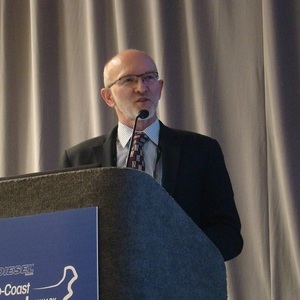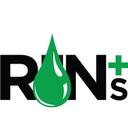NREL conducts biodiesel stability study in HPCR fuel systems

Photo: Ron Kotrba, Biodiesel Magazine
January 28, 2016
BY Ron Kotrba
National Renewable Energy Lab principal engineer Robert McCormick presented results at the 2016 National Biodiesel Conference & Expo in Tampa, Florida, Jan. 25-28, from a recent study on biodiesel stability in high-pressure common rail (HPCR) fuel systems for diesel engines.
The test was conducted to investigate the validity of OEM concerns over whether current stability requirements for B6-B20 biodiesel blends are adequate for modern diesel fuel systems. The stability requirement for B6-B20 blends are, at minimum, to endure a 6-hour Rancimat procedure before oxidizing beyond given thresholds.
NREL purchased B0 diesel fuel and biodiesels of varying stability to make B20 with a 6.5-hour induction time and a B20 with a 13.5-hour induction time. Four 2011 Volkswagen Passats were used during the test, and one fuel was used per car, with two of the vehicles using the 6.5-hour B20. A dynamometer was employed to get the fuel hot.
In HPCR systems, fuel travels through the system and experiences high temperatures and pressure, but not all of that fuel is injected into the cylinders for combustion. Some of it loops back into the supply.
Advertisement
Advertisement
After Dyno testing three of the cars were parked for two months.
Temperatures and samples were taken from the fuel tank, the rail and the return, where temperatures as high as 230 degrees Fahrenheit were measured. The fuels also endured a 95-degree soak and then 120-degree radiant heating in the fuel tank from below to simulate road heat.
While there was a problem of overheating in one of the vehicles that had nothing to do with the fuel, along with an anomalous data point of one of the fuels increasing in stability, both fuels—the 13.5-hour and the 6.5-hour B20s—showed decreases in stability, but induction times were high enough to still be in-spec.
Advertisement
Advertisement
No change in acid numbers, just a small increase in peroxide formation (indicating initial oxidation), no polymer formation and no change in the FAME profile were seen.
McCormick concluded by saying these results indicate that the current 6-hour minimum induction time is adequate to prevent the formation of deleterious acids and polymers in B20 biodiesel fuel.
The results and testing protocols will be published in April at the 2016 SAE World Congress in Detroit.
Other stakeholders in the testing included the Engine Manufacturers Assocation, Renewable Energy Group Inc., the National Biodiesel Board, VW and Mercedes.
Related Stories
Clean Fuels Alliance America on June 10 announced the launch of the newly redesigned BQ-9000 website, delivering a streamlined and user-friendly experience that better showcases the value of biodiesel quality assurance.
The U.S. EPA on Aug. 21 released data indicating nearly 2.04 billion RINs were generated under the RFS in August, up from 1.84 billion generated in August 2022. Total RIN generation for the first eight months of the year reached nearly 15.45 billion.
WestJet Group CEO Alexis von Hoensbroech, on Sept. 19 at the World Petroleum Congress in Calgary, addressed the airline's ambitions to achieve net-zero emissions by 2050 and the vital role SAF plays in the future of decarbonizing aviation.
Clean Fuels Alliance America, American Soybean Association, National Oilseed Processors Association the U.S. Canola Association are urging the Biden administration to adopt GREET for the purposes measuring GHG reductions for the SAF tax credit.
Montana Renewables LLC, a subsidiary of Calumet Specialty Products Partners LP, on Sept. 18 hosted an event to celebrate the first receipts of camelina oil into its biorefinery in Great Falls, Montana. The facility produces renewable diesel and SAF.
Upcoming Events










